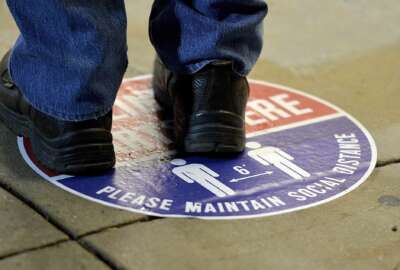
2020 roundup: Most key lawmakers for feds keep congressional seats
The vast majority of congressmen and senators who hold a key committee post or have a history of advocating for federal employees have won their reelection bids.
The presidential race is still up in the air as of this writing, but the picture in Congress looks much more clear.
Many members of Congress who yield some influence on committees important to federal employees and contractors or are familiar to the workforce have easily won reelection. A few others scrapped by with wins in tight races.
No surprise, the current chairman of the House Oversight and Reform Committee, Carolyn Maloney (D-N.Y.), held onto her seat, as did Rep. Gerry Connolly (D-Va.), chairman of the government operations subcommittee.
Both have spearheaded a wide variety of bills important to federal employees in recent years. Maloney was the main architect of the new federal paid parental leave program, and Connolly was a key author of the federal telework program, as well as the Federal IT Acquisition Reform Act.
Both Maloney and Connolly have also pushed for higher federal pay raises, support for the U.S. Postal Service and an independent Office of Personnel Management.
Reps. James Comer (R-Ky.) and Jody Hice (R-Ga.), the ranking members of the oversight committee and government operations subcommittee, respectively, have also won reelection.
Mark Takano (D-Calif.), current chairman of the House Veterans Affairs Committee, easily won his reelection, as did Adam Smith (D-Wash.), chairman of the House Armed Services Committee.
The ranking member of the veterans committee, Phil Roe (R-Tenn.), is retiring at the end of the year, as is Mac Thornberry (R-Texas), the ranking member of the House Armed Services Committee.
A large number of lawmakers who have been friendly to the federal workforce in recent years also retained their seats this week.
House Majority Leader Steny Hoyer (D-Md.), a 40-year incumbent, won another term. Throughout his many years in Congress, he’s pushed back against agency relocations out of the Washington, D.C., metropolitan area, advocated for higher federal pay raises and most recently introduced legislation designed to nullify the president’s Schedule F executive order.
He’s a major figure in appropriations debates, and he’s also backed measures to secure back pay for federal employees during recent government shutdowns.
Besides Hoyer, several other lawmakers in D.C., Maryland and Virginia easily held onto their seats in Congress. These include:
- Del. Eleanor Holmes Norton (D.C.)
- Rep. Anthony Brown (D-Md.)
- Rep. Jamie Raskin (D-Md.)
- Rep. John Sarbanes (D-Md.)
- Rep. David Trone (D-Md.)
- Rep. Don Beyer (D-Va.)
- Rep. Jennifer Wexton (D-Va.)
- Rep. Elaine Luria (D-Va.)
- Rep. Abigail Spanberger (D-Va.)
Beyer represents more federal employees than any other member of Congress. In recent months, he’s led efforts to roll back the president’s payroll tax deferral for federal employees.
Spanberger, a former CIA officer, eked out a close win against Republican challenger Nick Freitas.
Rep. Brian Fitzpatrick (R-Penn.), a former FBI supervisory agent who has joined his colleagues across the aisle in advocating for federal employees, picked up another term.
However, Rep. Donna Shalala (D-Fla.), a former secretary for the Department of Health and Human Services during the Clinton administration, did not win a second term.
In the other chamber, Sen. Mark Warner (D-Va.), vice chairman of the Intelligence Committee, easily picked up another six-year term. Warner has been another reliable advocate for federal employees. He’s worked to secure pay for federal contractors during the COVID-19 pandemic and has pushed for security clearance modernization from his position on the Senate Intelligence Committee.
None of the Maryland senators were up for reelection in 2020.
Sen. Gary Peters (D-Mich.), the current ranking member of the Homeland Security and Governmental Affairs Committee, won another term in a tight race. As the top Democrat on the committee, Peters has been especially critical of recent USPS operational changes made under Postmaster Louis DeJoy. He’s also opposed the administration’s efforts to merge the Office of Personnel Management and the General Services Administration.
Elsewhere in the Senate, Jim Inhofe (R-Okla.), the current chairman of the Senate Armed Services Committee, easily picked up his fifth term.
Polls predicted a tough reelection bid for Susan Collins (R-Maine), a senior member of the Senate Appropriations Committee, but she won another six-years with relative ease.
Collins has often joined her colleagues on the other side of the aisle on federal employee issues, opposing the president’s payroll tax deferral and a proposal to exclude Defense Department employees from collective bargaining.
She recently signed on as a co-sponsor to legislation that would make the payroll tax deferral optional for federal employees.
Copyright © 2025 Federal News Network. All rights reserved. This website is not intended for users located within the European Economic Area.
Nicole Ogrysko is a reporter for Federal News Network focusing on the federal workforce and federal pay and benefits.
Follow @nogryskoWFED
Related Stories




